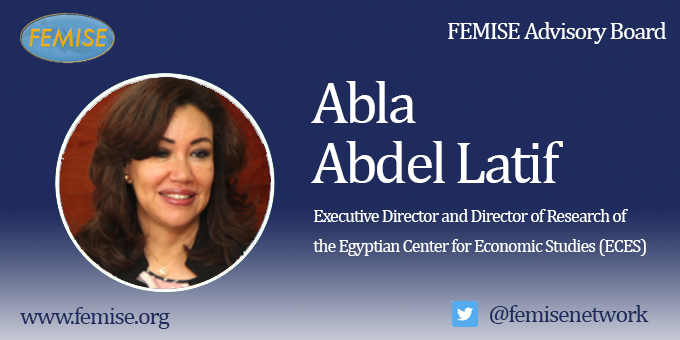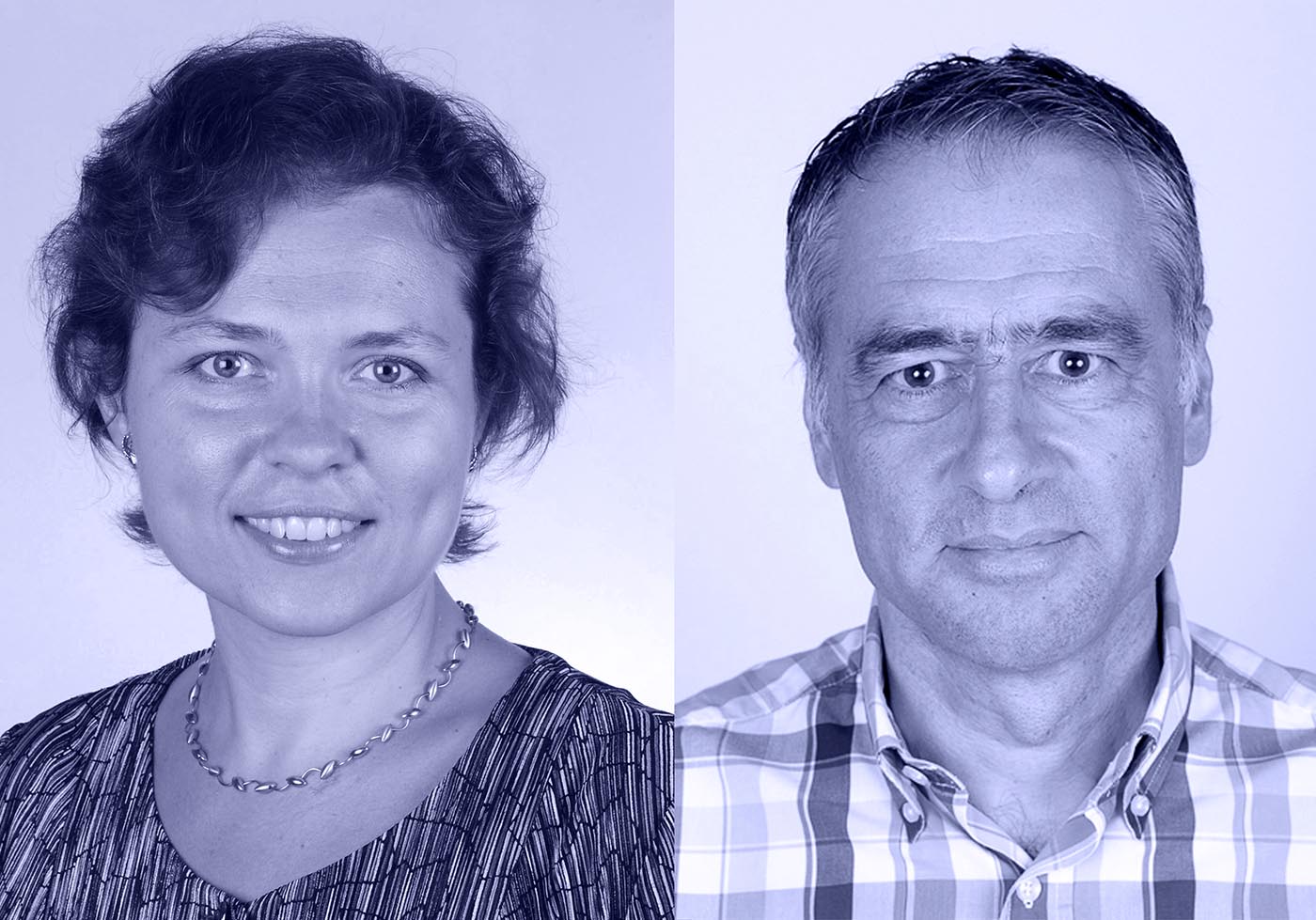Press Note, Marseille, 01 Avril 2021
We are very pleased to announce that the report on: “Ex-post evaluation of the impact of trade chapters of the Euro-Mediterranean Association Agreements with six partners: Algeria, Egypt, Jordan, Lebanon, Morocco and Tunisia” has been published.
The study was conducted by Ecorys, CASE and FEMISE as a consortium and commissioned by the Directorate General for Trade (DG TRADE) of the European Commission with the aim to evaluate the ongoing Euro-Med Free Trade Agreements (FTAs) between the EU and the Southern Mediterranean partners and present recommendations on how to unlock the potentials of these agreements.
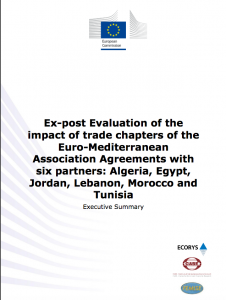 Following a detailed presentation of the objectives, scope and methodology of the ex-post evaluation (chap 1), the report provides a description of the different Euro-Med FTAs agreement and their implementations (chap 2). The report then presents an economic analysis with regards to the trade implication and interaction with other Euro-Med agreement (chap 3). This is followed by sectoral case studies for the implication on 4 specific sectors in those countries (Agri-food, Chemical, Machinery & transport equipment and textiles and clothing) (chap 4). The study then conducts a sustainable analysis assessment on the impact of trade on the environment, social and human rights and employment in these countries (chap 5). The study then concludes with overall findings and recommendations (chap 6).
Following a detailed presentation of the objectives, scope and methodology of the ex-post evaluation (chap 1), the report provides a description of the different Euro-Med FTAs agreement and their implementations (chap 2). The report then presents an economic analysis with regards to the trade implication and interaction with other Euro-Med agreement (chap 3). This is followed by sectoral case studies for the implication on 4 specific sectors in those countries (Agri-food, Chemical, Machinery & transport equipment and textiles and clothing) (chap 4). The study then conducts a sustainable analysis assessment on the impact of trade on the environment, social and human rights and employment in these countries (chap 5). The study then concludes with overall findings and recommendations (chap 6).
Recommendations include methodology on how to address non-tariff measures, improve the business environment in the South Med countries, expanding coverage of the agreements and ways forward with sustainable development implementations.
Background and context
The Euro-Mediterranean Association Agreements (AA) were conceived to contribute to the achievement of the objectives of the Barcelona Declaration. With the signing of the Barcelona Declaration in November 1995, a new phase of the Euro-Mediterranean partnership began. It aimed at creating an area of shared prosperity in the Mediterranean region and recognized that this required sustainable and balanced socio-economic development, an improvement in the living conditions of the populations, an increase in the level of employment and the encouragement of regional cooperation and integration. A key policy instrument for achieving this outcome was the eventual establishment of a free trade area between the EU and the South Mediterranean partners, through bilateral Euro-Med Free Trade Agreement (FTAs) which would remove barriers to trade and investment between the EU and Southern Mediterranean countries as well as between the Southern Mediterranean countries themselves.
In this context, the Directorate General for Trade (DG TRADE) of the European Commission has commissioned an evaluation of the impact of the trade chapters of the Euro-Mediterranean FTAs concluded with six partners: Algeria, Egypt, Jordan, Lebanon, Morocco and Tunisia, which was undertaken by the Consortium.
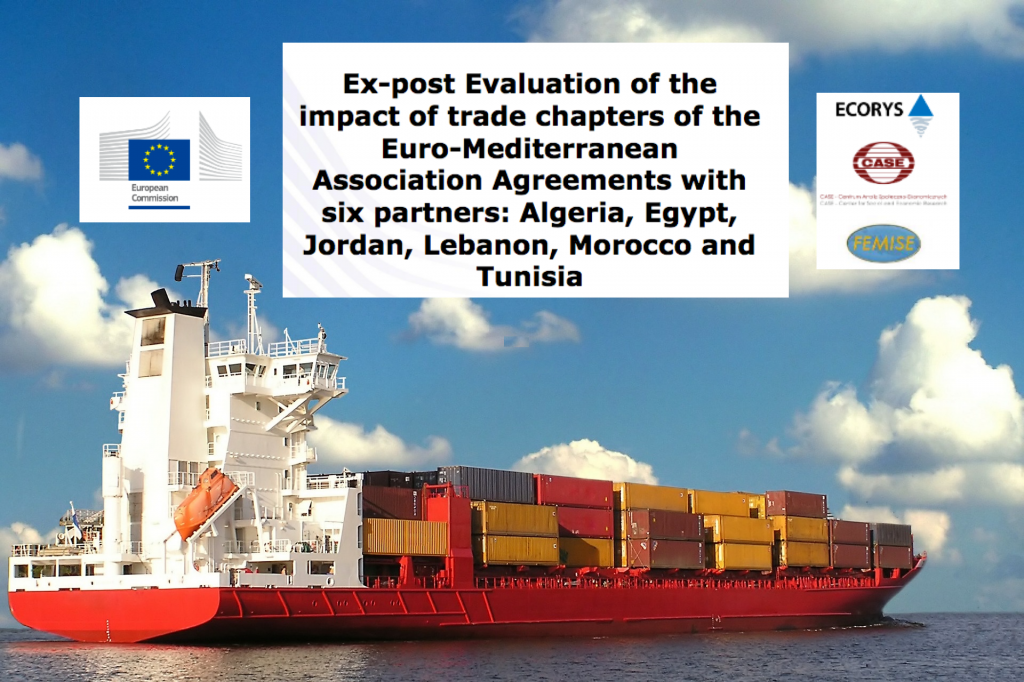 The purpose of the evaluation was to examine whether the main objectives of the trade chapters of the Euro-Mediterranean AAs and the supplementary trade protocols or agreements supplementing the FTAs have been achieved, as well as to assess the effectiveness, efficiency, relevance and coherence of the trade chapters of the AA. It is expected that the evaluation will help to determine best practice and lessons learned from the FTAs in order to better inform further implementation of the current Euro-Med FTAs as well as to enable cross fertilization of the gained insights across the various countries in the region to further enhance the Euro-Mediterranean partnership.
The purpose of the evaluation was to examine whether the main objectives of the trade chapters of the Euro-Mediterranean AAs and the supplementary trade protocols or agreements supplementing the FTAs have been achieved, as well as to assess the effectiveness, efficiency, relevance and coherence of the trade chapters of the AA. It is expected that the evaluation will help to determine best practice and lessons learned from the FTAs in order to better inform further implementation of the current Euro-Med FTAs as well as to enable cross fertilization of the gained insights across the various countries in the region to further enhance the Euro-Mediterranean partnership.
You can read/download the executive summary of the report here
You can read/download the full report here
The Report is prepared by:
Ecorys,: Project Lead: Nora Plaisier; Research: Dr Michael Fuenfzig; Pietro Maggi; Stakeholder consultations: Corine Besseling; Anne Winkel; Coordination: Michael Flickenschild),
CASE : Project Lead: Dr Przemysław Kowalski; Stakeholder consultations and research: Dr Katarzyna Sidło; Research: Dr Anna Malinowska; Project administration: Marek Peda; Quality control: Dr Christopher Hartwell and
FEMISE: Senior Economic Expert: Prof. Patricia Augier; Senior Consultation Expert and coordinator: Dr. Maryse Louis; Senior Sustainable Analysis Expert: Dr. Constantin Tsakas; Senior Social Expert: Dr. Franck Viroleau; Senior Environmental Expert: Dr. Stephane Quefelec; Senior Regional Economic Advisor: Prof. Michael Gasiorek, Sussex University; and contributions from Prof. Nicolas Peridy; Researchers: Dr. Novella Bottini; Dr. Myriam Ben Saad, Dr. Amandine Gnonlonfin; Dr. Rania Dial, Dr. Najla Kamergi; Research assistance: Dalia Seif, Jocelyn Ventura, Passainte Atef and Margaux Jutant.
The authors would also like to thank for the support of FratiniVergano –European Lawyers (Dr Tobias Doll),l’ISCAE Rabat (Dr Tarik El Malki, Hanae Ballari, Omar Hasnaoui), IACE –Institut arabe des chefs d’entreprises (Dr Majdi Hassen, Ibtissem El Ouartatani), ISSNAAD Consulting (Dr Ahmad Al-Shoqran), Arab African Advisers (Maggie Kamel and Sherif Fawzi Abdel Gawad) and Mona Mardelli-Assaf
FEMISE would like to thank all the team for their valuable contribution!




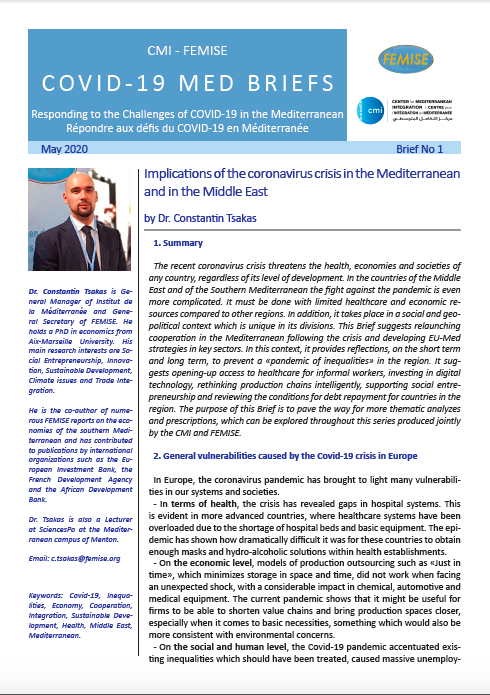

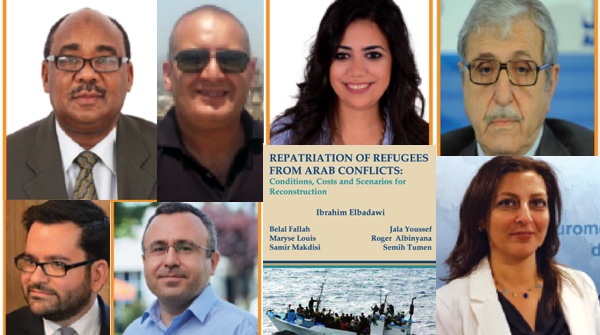
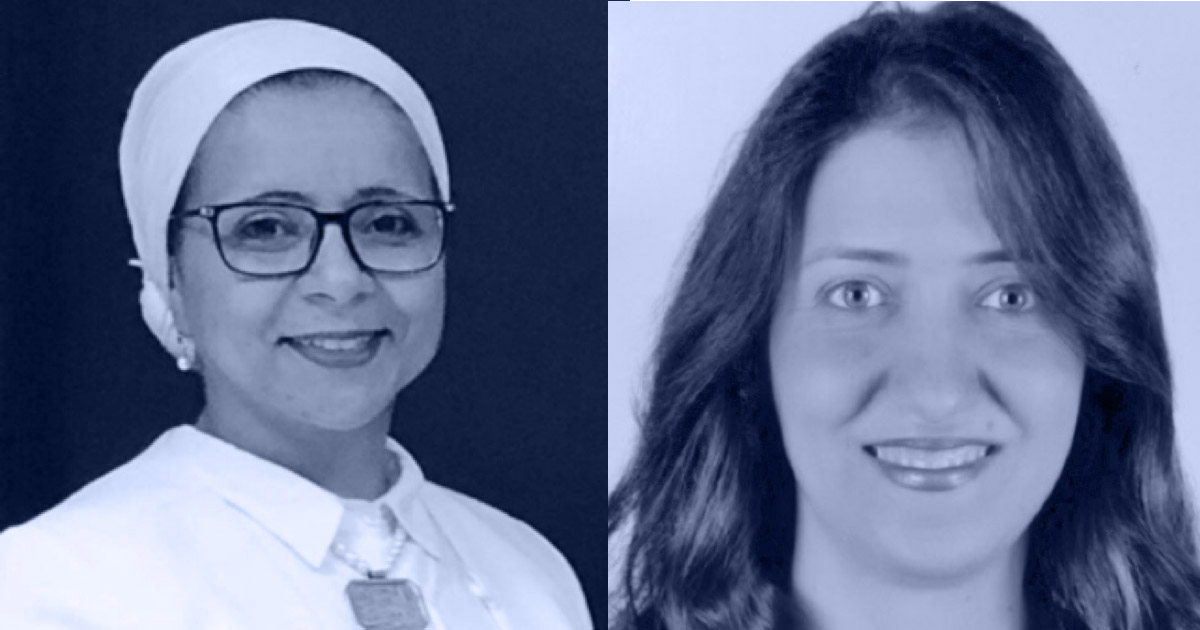
 The policy brief has been produced with the financial assistance of the European Union within the context of the FEMISE program. The contents of this document are the sole responsibility of the authors and can under no circumstances be regarded as reflecting the position of the European Union
The policy brief has been produced with the financial assistance of the European Union within the context of the FEMISE program. The contents of this document are the sole responsibility of the authors and can under no circumstances be regarded as reflecting the position of the European Union
